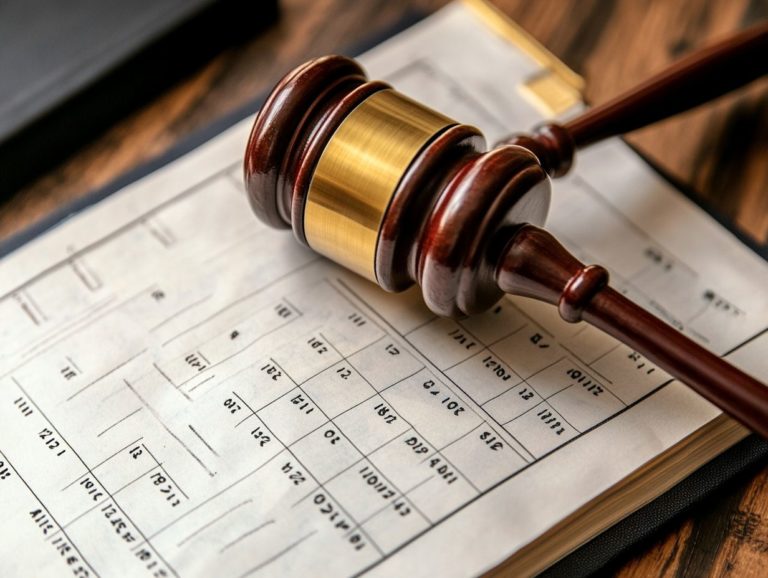Defensive Strategies for Fraud Cases
Fraud can feel daunting, but you can protect yourself and your finances! Fraud cases overwhelm individuals and businesses in significant ways. Understanding the various types of fraud and the common schemes used is essential for effective prevention.
This article delves into best practices for safeguarding against fraud. It outlines the initial steps to take when confronted with allegations and emphasizes the importance of gathering evidence for a robust defense.
It discusses strategic approaches to defending against fraud claims and highlights the critical role of experienced legal counsel.
Engage with this content to arm yourself with the knowledge necessary to navigate the complexities of fraud cases with confidence.
Contents
Key Takeaways:

Act now! Conduct regular audits and background checks to prevent fraud. If faced with fraud allegations, gather evidence quickly to build your defense. Working with skilled legal counsel can greatly improve your chances of successfully defending against fraud allegations.
Understanding Fraud Cases
Grasping the nuances of fraud cases is essential in today s intricate financial landscape, especially for institutions like credit unions that deal with identity verification and fraud detection.
With a myriad of schemes, such as embezzlement and insurance fraud, it s imperative for stakeholders to understand the risks of suspicious activities. This knowledge not only helps safeguard their interests but also protects their members from potential threats.
Understanding California law helps individuals assert their rights when confronted with such allegations.
Types of Fraud and Common Schemes
Fraud appears in various forms, from synthetic fraud and social engineering to phishing. Each employs distinctive tactics to mislead victims and compromise their financial accounts.
ACH fraud, or fraud involving electronic bank transfers, occurs when criminals access someone’s bank account to make unauthorized withdrawals.
Schemes targeting seniors and nursing homes are increasingly common, often employing emotional manipulation to gain the trust of vulnerable individuals. These tactics can include impersonation, with con artists posing as government officials or caregivers to exploit their victims.
To effectively combat these offenses, it s crucial to adopt robust defensive strategies. Consider implementing the following measures:
- Educate potential victims on how to recognize warning signs.
- Regularly monitor financial accounts for any irregularities.
- Utilize advanced security measures, such as an extra layer of security that requires more than just a password, to protect personal information.
Preventing Fraud
Preventing fraud demands a comprehensive strategy that weaves together effective defense mechanisms, strong security protocols, and continuous education.
This tailored approach addresses the unique challenges of the digital era, empowering both organizations and individuals to remain one step ahead of fraudsters.
Best Practices for Preventing Fraud
Implementing best practices for fraud prevention is crucial in today s digital landscape, where effective strategies can significantly lower the risk of financial fraud and safeguard sensitive member information.
In a world where technology is constantly evolving, organizations particularly credit unions must remain vigilant against potential threats. By leveraging advanced software solutions and robust security protocols, they can stay one step ahead of fraudsters.
Regular employee training sessions are essential for building awareness and equipping staff to identify suspicious activities. Additionally, engaging the community through informative workshops empowers members to be proactive against fraudulent schemes.
By tailoring these strategies to the specific needs of credit unions, you can cultivate a secure environment that not only protects valuable assets but also fosters trust and confidence among members.
Responding to Fraud Allegations

Responding promptly and effectively to fraud allegations is crucial for you, especially when facing suspicious activity that could escalate into serious criminal defense challenges and potential prosecution.
This situation highlights the vital importance of understanding your legal rights and handling these complexities carefully.
Initial Steps to Take
When faced with fraud allegations, your first steps should focus on gathering evidence and seeking legal counsel.
It’s essential for you to carefully keep records of all relevant interactions, transactions, and communications that could strengthen your case.
This thorough documentation becomes a critical resource as you navigate legal challenges.
Engaging with experienced legal counsel offers invaluable insights, ensuring you remain informed about your rights and options at every turn.
Understanding potential defenses and strategies can greatly impact the outcome of your situation.
You must effectively navigate the complexities of the legal landscape to protect your personal interests and empower yourself during what can be an overwhelmingly daunting time.
Gathering Evidence for Defense
Collecting the right evidence is key to your defense! It not only bolsters your case but also clarifies your legal rights when confronted with fraud charges suggesting an intent to deceive.
What Evidence to Collect and How to Use It
Securing bank information and other documentation is essential to counter any claims of suspicious activity.
You need to gather transaction records, communication logs, and any correspondence that can substantiate your legitimate business activities.
These types of evidence serve as powerful allies in your defense strategy, enabling you to present clear facts that challenge the allegations.
Your transaction records can reveal patterns of normal behavior that discredit claims of wrongdoing.
Clear documentation of communications demonstrates intent and transparency, strengthening your position.
Ultimately, each piece of evidence plays a crucial role in shaping your narrative and influencing legal outcomes.
Thorough evidence collection is an invaluable step in dispelling misconceptions surrounding fraudulent activity.
Building a Strong Defense
Crafting a robust defense against fraud allegations requires comprehensive strategies tailored to navigate the intricate landscape of criminal penalties.
This approach helps you get the finest legal representation possible.
Strategies and Tactics for Defending Against Fraud Allegations

Implementing effective strategies and tactics to defend against fraud allegations is crucial, especially where prosecution can lead to severe penalties.
Taking a proactive approach often means focusing on meticulous documentation and developing a thorough understanding of the legal landscape.
One effective tactic is to utilize forensic accounting, which involves detailed financial analysis, to identify discrepancies.
Enhancing employee training is another smart move, as it equips your team with the knowledge to recognize suspicious activities.
Real-world examples show that businesses conducting regular audits significantly reduce fraudulent occurrences.
Establishing a whistleblower program can also foster a culture of transparency.
By employing a multi-faceted strategy, you can navigate the complexities of fraud cases more effectively.
Working with Legal Counsel
When navigating the intricate landscape of fraud defense, collaborating with seasoned legal counsel is essential.
This partnership ensures that your legal rights are steadfastly upheld while equipping you to face any potential criminal penalties in accordance with California law.
Importance of Hiring an Experienced Attorney
Hiring an experienced attorney is crucial for a strong fraud defense. Their deep knowledge of the criminal justice system can greatly influence your case’s outcome.
An attorney familiar with fraud cases understands California law and has strong negotiation skills. This expertise often helps secure better plea deals.
With extensive experience, they can craft personalized defense strategies based on past successes. Their insights allow them to navigate the complexities of fraud charges effectively.
Frequently Asked Questions
What are defensive strategies for fraud cases?
Defensive strategies are legal methods used to fight fraud accusations, including defensive strategies for theft charges, challenging evidence, and proving a lack of intent.
Do I need a lawyer for my fraud case?

Yes, hiring a lawyer is highly recommended. They know how to navigate the legal system and build a solid defense.
What is the burden of proof in a fraud case?
The prosecution has the responsibility to prove the case. They must show beyond a reasonable doubt that the accused committed fraud.
Can I use self-defense as a strategy in a fraud case?
No, self-defense does not apply to fraud. It s only relevant in situations involving physical threats.
What is the difference between a criminal and civil fraud case?
In a criminal fraud case, jail time may be imposed if found guilty. In a civil case, the consequences are financial restitution without criminal charges.
How long does a fraud case typically last?
The length of a fraud case varies. Cases can take several months to years, depending on their complexity and court schedules.






